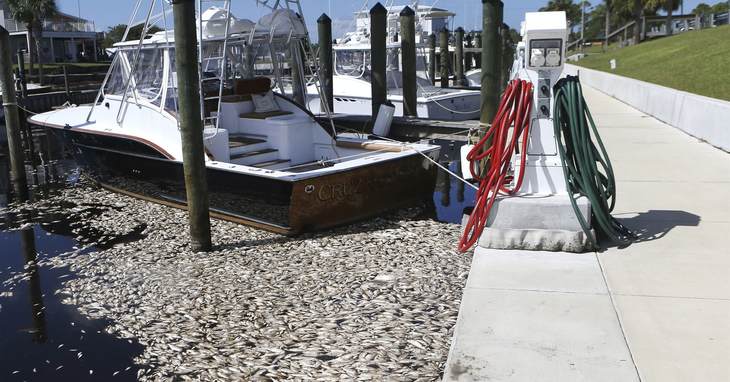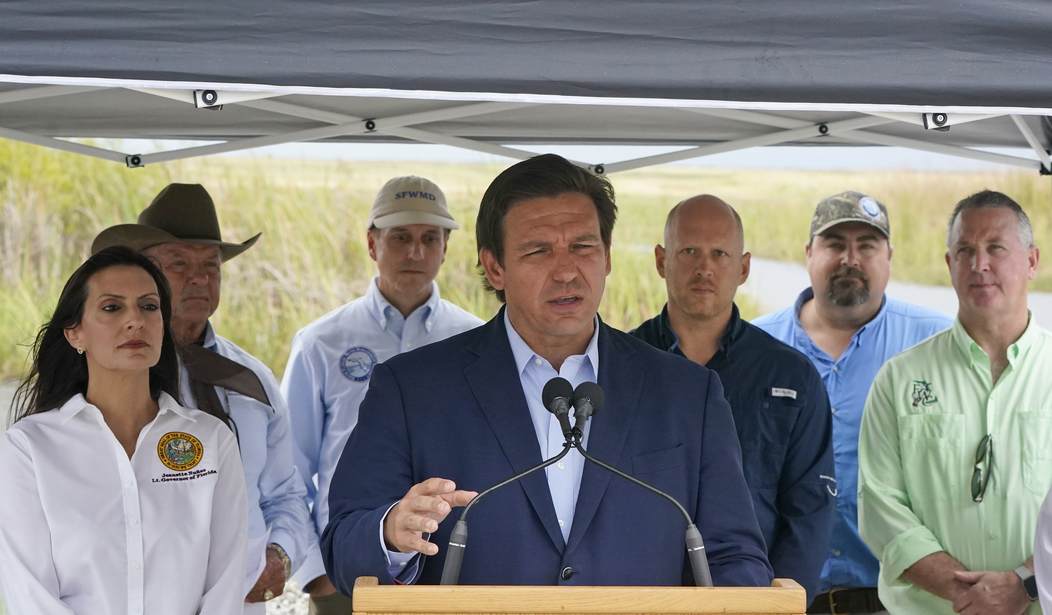Trying to cast him as the cause of a generational problem is just the start of the press’ issues.
The media taking a negative posture towards Florida Governor Ron DeSantis is more than a given any longer. It has become the case that we can count on any smear seen in the press as becoming something that will backfire significantly. As covered this morning by Joe Cunningham, the reflexive scorn dumped on DeSantis for his call to get vaccinated is defied by all the previous press coverage, where they attempted to scorch him for how he has been pushing the vaccine in the incorrect fashion.
One other emerging story is far less sexy but no less incompetent. Currently, on the west coast of Florida, there is a mounting problem of large amounts of dead sea life collecting on beaches and in waterways, from a significant red tide bloom. This is a caustic result of waste runoff into the Gulf of Mexico, fueling the large growth of an algae that tints the water and is fatal to aquatic life. It takes little to see how this will be spun into a potential hit against DeSantis.
Politico takes this on, and right from the start, writer Bruce Ritchie manages to slip right off the dock. “Florida Gov. Ron DeSantis is facing a potentially new crisis as he readies his 2022 reelection: thousands of tons of dead fish.”
Calling this a new crisis is rich, considering that red tide has been a persistent issue in this state for generations, and that cases of this have dated back all the way back to the 1800s.The article even states one of the worst algae blooms occurred just before DeSantis was elected, but this is a new crisis, we are led to believe.
The spin is more than evident in the framing of this piece. Before they even get into the details of the governor’s actions and response, the first thing done is to give voice to “critics” of how DeSantis is handling the matter; small coincidence, the two critics found happen to be the Democratic challengers to DeSantis in next year’s election, Charlie Crist, and Nikki Fried.
Crist sounds grave as he states DeSantis “needs to take immediate action” on the matter; yet Ritchie does not correct the state representative, even while deeper in the piece they detail that the governor has been taking action, including commissioning work to be done as of this past Monday — ahead of Crist’s edict. Nikki Fried comments that she has not heard from the governor on the matter, the fact that her contentiousness with the governor may stifle such communications notwithstanding, her not being contacted does not amount to inactivity.
Eventually, the article gets to detailing that DeSantis has in fact been rather proactive on the issue. From early in his term, he has set up a task force and allocated state funding to be applied towards the matter — but there is also an issue with this not being a strictly Tallahassee-run solution. St. Petersburg Mayor Rick Kriseman decided to make things political — by accusing DeSantis of politicizing the issue. This is not the cagey decision the mayor believes, for a couple of reasons.
The main talking point is that the governor has not declared a state of emergency over the recent bloom, but DeSantis has shown to be on top of the matter. “They were the ones who were saying, ‘you’ve gotta declare a state of emergency.’ And so, we asked them why? Well, they didn’t know why. They just wanted to do it for a political talking point.”
There is a sound reason behind this decision. There are funds already established to take on the issue, and an emergency order would divert other money from potential, other emergencies in other areas across Florida.
DeSantis, speaking to reporters during a press conference at the Fish and Wildlife Research Institute in St. Petersburg, said the area appears cleaner than a week ago, as dead fish are being collected and state funds are flowing into the response to the algae bloom.
As for the cause of this ongoing problem, Mayor Kriseman would be wise to not bring up the issue. One of the primary reasons behind these algae blooms is the infusion of large amounts of human waste. The St. Petersburg water treatment has been an ongoing source of problems — problems which predate the DeSantis administration, but directly involve decisions by Kriseman.

A sewage report issued about the city’s capacity and handling of its wastewater, detailed in The Tampa Bay Times, looked into the matter of 200 million gallons of sewage released into neighborhoods and waterways. The main cause cited was the closure of a major water reclamation facility, and the decision to forestall the expansion of other water facilities to handle a flooding emergency. This gamble, rooted in money-saving efforts, proved disastrous as the region was hit with a hurricane and a tropical storm, leading to excessive flooding.
“(St. Petersburg’s) leadership has had a culture of being willfully and negligently indifferent toward known problems in its wastewater treatment system that ultimately lead to some of the largest wastewater discharges in State history.” — Florida Fish and Wildlife Conservation Commission report
Kriseman has been shown to downplay and underreport such incidents. Additionally, that 2018 event was precipitated by the city having over 2 million gallons of wastewater discharged via numerous spills over a 3-month period. The facilities are operated by and funded by the municipalities, so for them to imply the governor has been lax in addressing the central problem is the very definition of deflection.
This knee-jerk desire to make political hits on DeSantis without fully vetting the particular issue continues. The press is set on AUTOMATIC with these hits, and local politicians like Rick Kriseman assume they are dealing with a less-skilled politician. The end result — all too often — becomes a poor reflection on those leveling the accusations. Politico and Mayor Kriseman should rethink their approaches, as they only expose themselves with such low-caliber attacks.














Join the conversation as a VIP Member